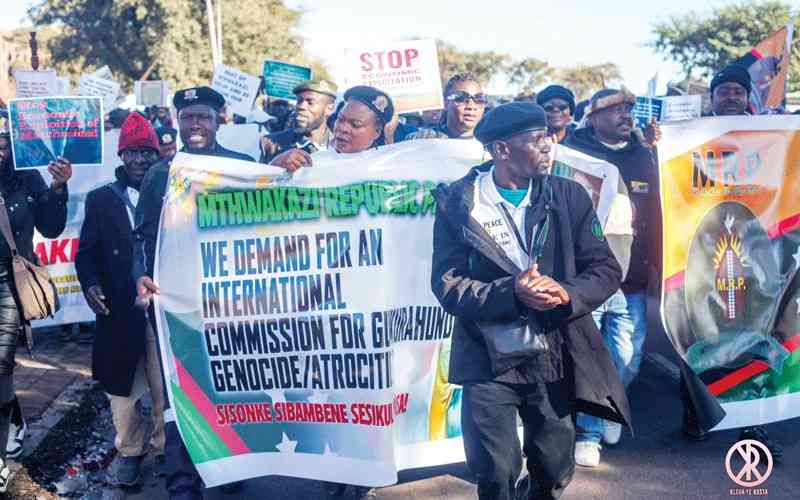
[ad_1]
AS we reflect on the just passed International Day on Democracy, we find it worrying that Zimbabwe has not ratified the African Charter on Democracy, Elections, and Governance. It is a long time since President Emmerson Mnangagwa, as one of his first acts on taking office, signed the Charter, and now is the opportune time to ratify it.
A Charter is the same as a treaty, that is, a formal agreement entered into by countries. A State party to a treaty is any country that has signed and ratified the treaty, and is, therefore, bound by the terms of that particular treaty.
It is essential that a State party ratifies a treaty; ratification is a declaration by that State to be bound at an international plane by that treaty.
The African Charter on Democracy, Elections, and Governance (the Charter) was adopted on January 30, 2007 at an AU Assembly of heads of States.
A majority of AU States and most Sadc States have both signed and ratified the Charter and it is becoming the accepted blueprint for democracy, elections and governance for successful African States.
There was a great deal of favourable publicity when Mnangagwa signed the Charter at his first African Union Summit of Heads of State and Government on March 21, 2018, in Kigali, Rwanda.
The next step after a treaty has been signed is to get it approved by a country’s Parliament — if the country has a constitution that provides for this, which Zimbabwe does. It is at this point, however, that government’s enthusiasm for the Charter seems to have evaporated.
- Chamisa under fire over US$120K donation
- Mavhunga puts DeMbare into Chibuku quarterfinals
- Pension funds bet on Cabora Bassa oilfields
- Councils defy govt fire tender directive
Keep Reading
Veritas lobbied Parliament to get the Charter approved by Parliament before the general election in 2018. Unfortunately, that did not happen.
Nevertheless, Veritas continued lobbing the new Parliament and after all the budget hearings had the support of the Speaker.
Eventually, a year after the President had signed the Charter, resolutions by both Houses of Parliament approving the Charter were passed during March 2019.
This approval did not mean, however, that Zimbabwe was now a full State party to the Charter. Parliamentary approval of the Charter should have been followed by Mnangagwa signing the country’s Instrument of Ratification of the Charter and deposit the Instrument of Ratification at the African Union headquarters in Addis Ababa through our ambassador to the African Union.
Ratification is the final action by government to make Zimbabwe a full State party to the Charter — both in terms of the Charter itself and under international law principles.
Current position
The Instrument of Ratification, if it was ever signed, has still not been deposited. The AU website updated status list for the Charter confirms that Zimbabwe signed the Charter on March 21, 2018, but shows that ratification has not taken place to date.
Whatever the reason for the delay in ratification, government renders itself liable to the accusation that it no longer subscribes to the ideals of democracy, free and fair elections and good governance embodied in the Charter.- Veritas
Stakeholders must foster peace to ensure development
AFTER we celebrated the International Day of Peace on September 21, 2021, running under the theme Recovering Better for an Equitable and Sustainable World, the Zimbabwe Election Support Network (Zesn) implores all stakeholders to engage and work together in fostering peace building initiatives to ensure sustainable peace and development in the country.
The International Day of Peace or Peace Day is observed around the World annually on September 21. Established in 1981 by a unanimous United Nations resolution, Peace Day provides a globally shared date for all humanity to commit to peace above all and to contribute to building a culture of peace.
As Zimbabwe joined the rest of the world in commemorating this special day, Zesn strongly believes that peace can be sustained through a multi-stakeholder approach and appreciation of the unique roles each stakeholder plays.
The network calls for the strengthening of the National Peace and Reconciliation Commission (NPRC) and the Zimbabwe Human Rights Commission (ZHRC), faith-based organisations (FBOs), civic society organisations (CSOs), community-based organisations (CBOs), educational institutions, political parties and the media as they are critical stakeholders in fostering a culture of peace and tolerance in society.
Zesn acknowledges and applauds the significant role that NPRC, ZHRC, FBOs, CSOs and CBOs play in conflict resolution, through peace-building education and teaching, early warning, mediation, emergency relief and support, information and data collecting as well as advocacy.
Educational institutions, on the other hand, are key as they are conduits of values of peace, coexistence and tolerance.
Further, Zesn notes the significant role played by the traditional justice system which has seen traditional leaders being consulted to foster reconciliation within the community on many issues including political and electoral matters.
The network thus calls upon the government and CSOs to provide traditional leaders with the requisite skills in public administration, developmental policies and law so that they can effectively settle community disputes in their jurisdictions as vanguards of traditional law.
Zesn calls upon the government to strengthen conflict resolution mechanisms and early warning systems to ensure that peace, tolerance and respect for human rights are upheld in Zimbabwe. Zesn is committed to the promotion of peaceful, democratic and credible elections in Zimbabwe. Zesn
Twitter space a panacea to propaganda
TWITTER has taken southern Africa by storm particularly in Zimbabwe, where most government-controlled media outlets are churning out propaganda.
It has come as a relief to most Zimbabweans who were failing to air their views and interrogate their leaders on air.
Propaganda in Zimbabwe has risen to unprecedented levels, but will soon be a thing of the past.
Live phone-ins conducted by some radio stations, for example, are restricted and sponsored by government operatives, where some callers are coached on what to say and are ordered to praise certain leaders.
Twitter has become a reflection of reality, although it is still being accessed by very few people due to the high cost of data.
Twitter has by-passed the idea of gatekeeping very important information. It has become another area of serious debate outside parliamentary debates.
People have managed to articulate their ideas and points without being gagged or censored. Participates have managed to pose very important questions to the main speakers.
The mainstream media has been exposed. It is becoming more irrelevant as time passes.
Youths are encouraged to flood Twitter and be active on this global debating forum and communicate with different people through discussions.
I pray that government won’t interfere with Twitter by disrupting the network when very important issues are being discussed.
The mainstream media is no longer having that monopoly anymore, it is facing a stiff competition.
The antidote for information deficiency and poverty has been found on Twitter.
Twitter participants have become more interactive unlike some so-called leaders who just post and disappear into thin air without interacting with the audience.
Interestingly, Twitter has exposed some poor traits of politicians masquerading as leaders.-Leonard Koni
[ad_2] Source link










